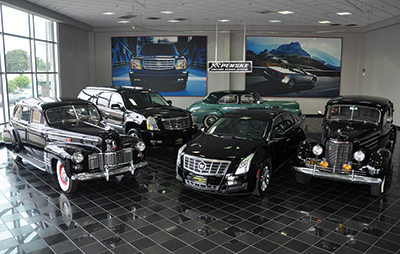Acton & SoCal Penske Showcase Variety of Vehicles
- Details
 Penske Cadillac Buick GM in Torrance, Calif.
BY SUSAN ROSE
Penske Cadillac Buick GM in Torrance, Calif.
BY SUSAN ROSE
SINCE THE EARLY ’90s, ACTON FLEET SALES (AFS) has been known as the largest provider of Lincoln Town Car chassis for coachbuilders as well as for always carrying an extensive inventory of livery vehicles. Bill Cunningham, general manager of Acton Fleet Sales, and Coleman Hoyt, owner of the former Acton Lincoln Mercury, built a solid reputation over two decades through honesty, integrity, and overall industry support.
In 2011, Cunningham and Hoyt were presented with a series of unique challenges: The legacy Lincoln Town Car was entering its final months of production, the Mercury brand had been discontinued, and Ford was considering terminating the Acton (Mass.) Lincoln dealership to consolidate its national sales footprint (despite the fact that Acton had sold more Town Cars to fleet buyers than any other dealer in the country, according to Hoyt.)
Hoyt decided to surrender his Lincoln franchise and revise his retail dealership to carry Chrysler, Dodge, Jeep, and RAM. This was a game-changing moment for operators who had relied on Acton Lincoln Mercury and AFS for a consistent supply of commercial fleet vehicles. The field for the Town Car replacement was wide open, and this gave AFS the opportunity to expand its offerings beyond Lincoln. In 2012 with approval from Ford Motor Company, AFS formed a relationship with Sentry Auto Group of Boston to continue to offering Lincoln products, according to Hoyt. Chrysler’s commercial fleet department took notice of Acton’s national presence soon thereafter and sought Acton’s advice in developing a Chrysler 300 livery sedan. That same year, the AFS brand expansion included a new partnership with SoCal Penske Professional Vehicles (SCP) in Cerritos, California, a subsidiary of the SoCal Penkse Auto Group that is owned and managed by Philip Hartz, president. Hartz is a veteran employee of both Ford and GM, and a longtime friend and business colleague of Hoyt.
Swiss Operators Find Neutral Ground
- Details
 BY SUSAN ROSE
BY SUSAN ROSE
Each January, the biggest event in Switzerland takes place high in the blue-gray peaks of the Swiss Alps when the World Economic Forum holds its flagship meeting. During the five-day meeting, thousands of VIPs from all over the world descend upon the scenic city of Davos to discuss matters of international policy, including issues like poverty, illness, and environmental concerns. The invitation-only guest list is long: speakers, CEOs from the Forum’s 1,000 member companies, world leaders and heads of state and government, non-governmental organizations, religious scholars, and members of academia—not to mention the throngs of media and staff.
The event is also the largest for Swiss transportation providers like Astro Limousine Service Ltd. The corporate company has been driving guests of the Davos conference—nearly two hours from its headquarters in Switzerland’s largest city, Zurich—for over 25 years. Ralph-Martin Trummel, whose parents founded Astro in 1985 and who is soon to be its president, has been handling the event for the last 9 years for the company. He’s used to the months of preparation and hard work that is required.
If You're Not Concerned About Uber...You Should Be
- Details
 National and local associations across the country are getting involved in fighting against these apps.
BY SUSAN ROSE
National and local associations across the country are getting involved in fighting against these apps.
BY SUSAN ROSE
We as an industry shouldn’t be surprised by the rogue apps that are rapaciously digging in their claws and causing major concern for operators in many cities. It shouldn’t be a shock that technology found a better and cheaper way to get customers into vehicles. A few years ago, we adjusted to same-day bookings, even last-minute bookings. Today we’re watching customers get excited about a technology that allows them to book the vehicle of their choice at the price point of their choice and have transportation in five minutes or so. Who wouldn’t love that?
Uber and other mobile, on-demand vehicle apps are sweeping the world, and they are all about convenience and near instant gratification. When the customer registers for the service, he submits a credit card that is charged after the service is provided. No cash exchanges hands, no gratuities are required (it’s included). There are no long and lengthy itemized bills to review and sign.
Putting "Leader" Back in Leadership
- Details
 BY BRETT TYSON
BY BRETT TYSON
Leading a team while also having the operational deliverables resting on your shoulders can be a daunting task. Those of us who are managers have been stretched by this task and let’s face it, we have not always done well. It’s not hard to figure out. When there isn’t time to do everything on our plates, everyday seems like a whirlwind. When we are constantly running to put out the fires and fix the mistakes we did not see coming, something gets missed. I have lived this life, and I did not like it.
Last month I discussed three steps to a better performing company. In this article, I will illustrate the ways out of this world of chaos so that your company is more manageable for your trusted employees. The concrete strategies that I discuss are taught to operations managers every day to help them get in—and stay in—control. To be a successful leader and manager, you must be able to set aside the things that aren’t as important so you can carve out a path to achieve the results you want.
At the very beginning of any strategically successful endeavor is clear goal setting. You must know what you want. Many managers are not clear with staff about this, and then they wonder why their employees struggle. Clear goal setting needs to follow some basic rules to be effective, and one method that I really like is the SMART tool, which allows you to make sure your goals will hold up and serve your interests. This is a great activity to do with your staff as it a solid teambuilding exercise that will get everyone focused on the path forward. Sharing the Goal With Your Workforce

